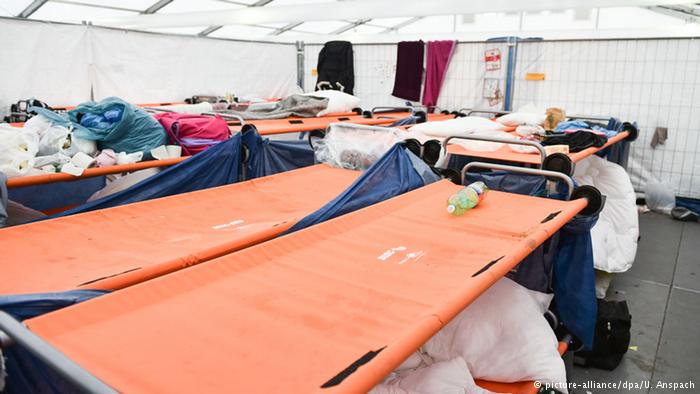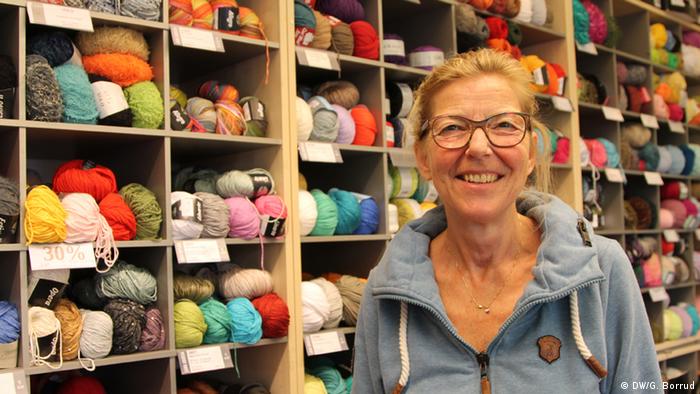If you ask Germans whether they would host refugees for 20 euros a day, you will likely get a very clear answer – either negative or positive. But if you ask to take their picture, you may get the finger.
I had what I thought was a relatively straightforward task this weekend. Go out and ask people on the streets of Cologne if they would support a recent Green party proposition to allow residents to host asylum applicants in their homes in exchange for 20 euros ($22) a day.
The responses from the more than 50 people I asked ranged from amicable to virulent.
“You could pay me 100 or even 1,000 euros a day. I still wouldn’t let them in my home. No way,” said a woman in her 30s working at a fruit and vegetable stand.
“Oh, absolutely – I would open my doors. My family and I belong to what should be Germany’s culture of welcoming for the persecuted around the world,” said a gaunt man with a flannel shirt and necktie who also said he was currently unemployed.
“I was a kind of refugee myself 18 years ago when I came to Germany from Afghanistan, so I feel it is my duty to give back. Yes, I would take a refugee in my house if the state paid me 20 euros a day,” said a man behind the counter of a kiosk who looked about 50.
Over half of the people said they were willing to open their doors to asylum applicants – on principle, at least: All but three of those who said they would host also said their current living situations would not allow them to sign up for the proposition right now.
Camera shy?
It was after the questions had been answered that things got tricky.
“Would you have anything against me taking your picture for a gallery on our website dw.com?”
The responses here ranged from agitated confusion to downright anger.
“No. I don’t want that.” That was the most common. “You’ve got to be fooling me.” That came up more than once. “Get well soon!” That one took me a little by surprise.
Touchy subject
But when I asked the reason for the reluctance – that’s when things got interesting.
“For this subject, I’d really rather not make any statements in public. … That’s just the way it is,” said a 40-year-old chiropractic assistant who incidentally had nothing against accommodating refugees. “You hear all the time about the attacks against refugees. I don’t want anything to do with it,” she added.
“You journalists haven’t got a clue at all,” said an effusive 26-year-old (strongly against housing refugees) wearing a red jogging suit and walking a dog. “All media are just serving their own purposes – to make us think a certain way. I would never give you my picture. I don’t want to be involved in that.” Wouldn’t a picture lend credibility to your statements regarding Germany’s asylum policy, I asked. “Credible? I have never read anything credible in mainstream media in my entire life.”
A 39-year-old Lufthansa flight attendant who would host asylum applicants if he had the space said: “Unfortunately, I have my work clothes on!” He was decked out in dark blue and gold waiting for the street car on his way to work. Does Lufthansa have anything against refugees, I asked: “No – of course not – but I don’t want my picture to pop up in this connection – with me wearing my work clothes. Would he put his jacket on and cover his work clothes? “No, please, no.”
On and on it went. It didn’t matter where I was in Cologne; among the ritzy villas of Marienburg or the apartment blocks in Zollstock, nobody wanted to give me their picture. (I specifically avoided the center of town. Nobody who lives in Cologne would go to that zoo of tourism on a Saturday afternoon.) And the main reason given was the topic. They didn’t want to have their name – and face – attached to the issue of refugees.
But then I walked into Marga Knott’s knitting store.
“I have no problems with the public eye,” she said, after explaining that her apartment was far too small to even fathom hosting her girlfriend, let alone refugees. “But, on principle, by all means,” she said, beaming.
I told her that I was having real trouble finding people to put their face behind her their words. “Yeah, what to do with refugees, it’s kind of a touchy subject here these days. But I don’t mind.”
Fear and fascination – for media
Without a doubt, the topic of refugees and how to deal with the spike in numbers is a touchy subject here in Germany. This could very well explain what seemed to me the paradox of having an opinion but a simultaneous unwillingness to express that opinion openly – that is, with a photograph. Germany is no longer a totalitarian regime. The freedom of opinion, and the press, is anchored in the constitution.
“Germans don’t want to have anything to do with the media, because it is a vehicle for scandal,” the sociologist and communications researcher Hans Mathias Kipplinger told DW. “But the paradoxical thing is, the more they fear it, the more they consume it,” he said.
“The [issue of refugees] has become one of the most polarized we’ve ever seen,” Kipplinger said. “The two poles of fear and fascination are working overtime, it would appear.”
Whether it was fear or fascination at work in the people I talked to this weekend, I’m not sure. But their enthusiasm to talk, on the one hand, coupled with an aversion to be quoted, on the other, is definitely very perplexing indeed.











